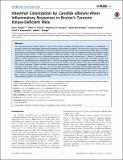Intestinal Colonization by Candida albicans Alters Inflammatory Responses in Bruton's Tyrosine Kinase-Deficient Mice
Author(s)
Strijbis, Karin; Dougan, Stephanie K.; Esteban, Alexandre; Gröne, Andrea; Kumamoto, Carol A.; Yilmaz, Omer; Ploegh, Hidde; ... Show more Show less
DownloadYilmaz_Intestinal colonization.pdf (6.772Mb)
PUBLISHER_POLICY
Publisher Policy
Article is made available in accordance with the publisher's policy and may be subject to US copyright law. Please refer to the publisher's site for terms of use.
Terms of use
Metadata
Show full item recordAbstract
The commensal yeast Candida albicans is part of the human intestinal microflora and is considered a “pathobiont”, a resident microbe with pathogenic potential yet harmless under normal conditions. The aim of this study was to investigate the effect of C. albicans on inflammation of the intestinal tract and the role of Bruton's tyrosine kinase (Btk). Btk is an enzyme that modulates downstream signaling of multiple receptors involved in innate and adaptive immunity, including the major anti-fungal receptor Dectin-1. Colitis was induced in wild type and Btk-/- mice by treatment with dextran sodium sulfate (DSS) and the gastrointestinal tract of selected treatment groups were then colonized with C. albicans. Colonization by C. albicans neither dampened nor exacerbated inflammation in wild type mice, but colon length and spleen weight were improved in Btk-deficient mice colonized with C. albicans. Neutrophil infiltration was comparable between wild type and Btk-/- mice, but the knockout mice displayed severely reduced numbers of macrophages in the colon during both DSS and DSS/Candida treatment. Smaller numbers and reduced responsiveness of Btk-/- macrophages might partially explain the improved colon length of Btk-/- mice as a result of Candida colonization. Surprisingly, DSS/Candida-treated Btk-/- animals had higher levels of certain pro-inflammatory cytokines and levels of the anti-inflammatory cytokine TGF-β were reduced compared to wild type. A clustering and correlation analysis showed that for wild type animals, spleen TGF-β and colon IL-10 and for Btk-/- spleen and colon levels of IL-17A best correlated with the inflammatory parameters. We conclude that in Btk-/- immunocompromised animals, colonization of the gastrointestinal tract by the commensal yeast C. albicans alters inflammatory symptoms associated with colitis.
Date issued
2014-11Department
Massachusetts Institute of Technology. Department of Biology; Whitehead Institute for Biomedical ResearchJournal
PLoS ONE
Publisher
Public Library of Science
Citation
Strijbis, Karin et al. “Intestinal Colonization by Candida Albicans Alters Inflammatory Responses in Bruton’s Tyrosine Kinase-Deficient Mice.” Ed. David R. Andes. PLoS ONE 9.11 (2014): e112472.
Version: Final published version
ISSN
1932-6203